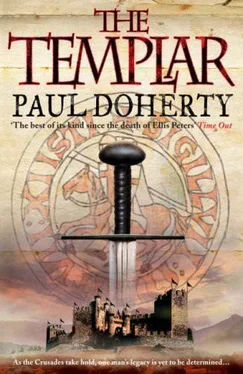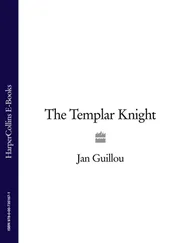P. Doherty - The Templar
Здесь есть возможность читать онлайн «P. Doherty - The Templar» весь текст электронной книги совершенно бесплатно (целиком полную версию без сокращений). В некоторых случаях можно слушать аудио, скачать через торрент в формате fb2 и присутствует краткое содержание. Год выпуска: 2010, ISBN: 2010, Издательство: Minotaur Books, Жанр: Исторические приключения, на английском языке. Описание произведения, (предисловие) а так же отзывы посетителей доступны на портале библиотеки ЛибКат.
- Название:The Templar
- Автор:
- Издательство:Minotaur Books
- Жанр:
- Год:2010
- ISBN:9780312576837
- Рейтинг книги:5 / 5. Голосов: 1
-
Избранное:Добавить в избранное
- Отзывы:
-
Ваша оценка:
- 100
- 1
- 2
- 3
- 4
- 5
The Templar: краткое содержание, описание и аннотация
Предлагаем к чтению аннотацию, описание, краткое содержание или предисловие (зависит от того, что написал сам автор книги «The Templar»). Если вы не нашли необходимую информацию о книге — напишите в комментариях, мы постараемся отыскать её.
The Templar — читать онлайн бесплатно полную книгу (весь текст) целиком
Ниже представлен текст книги, разбитый по страницам. Система сохранения места последней прочитанной страницы, позволяет с удобством читать онлайн бесплатно книгу «The Templar», без необходимости каждый раз заново искать на чём Вы остановились. Поставьте закладку, и сможете в любой момент перейти на страницу, на которой закончили чтение.
Интервал:
Закладка:
The attack would soon commence. To the south of the city Raymond of Toulouse moved his tower closer to the dry moat. In the north, Godfrey of Bouillon tried to mislead the defenders, who had been busy raising the level of the wall opposite the second soaring siege tower. Tancred, Hugh and Godefroi were sent out to spy, and returned to report how that section of the fortifications was almost impregnable. A sharp discussion took place. Theodore was present and he later gave the information to Eleanor, who included it in her chronicle. Godfrey of Bouillon realised that their great attack must not fail, so when night fell, he gave secret orders for the tower to be dismantled timber by timber. The separate parts would be carried a mile further along the wall to where the fortifications were lower and the ground more level. The same applied to the mantlets and stone-throwers. Under the cloak of darkness the great siege tower was literally stripped, dismantled storey by storey, the beams passed down to waiting soldiers. Silence was ordered. No candles or lanterns were lit, nor did they make use of oxen-pulled sledges, as the garrison might hear these and sally out. Progress was slow, but by dawn, the defenders of the city realised that their preparations to protect that section of the wall had failed: Godfrey of Bouillon had moved his entire attack a mile further south. Nevertheless, the stone-throwers and tower had to be rebuilt. More days passed. On the evening of 13 July, however, everything was ready. The order was given. At dawn the following morning, the Army of God would launch its all-out assault on the city of Jerusalem.
‘Days of Anger, Days of Fire, Days of Vengeance!’ was the phrase Eleanor of Payens used in her chronicle to describe the furious final assault on the Holy City. A time of deep anguish, of bitter loss and sordid betrayal, yet she wanted to capture it all. She sent Simeon to collect stories and tales that she could then weave alongside her own about that season of blood, of ferocious courage on both sides, a savagery that must have made Satan and all his fallen angels weep. Everyone realised judgement was imminent. The bowl of God’s fury was to be tipped out, but whom would it consume? On the evening of 13 July, the Year of Our Lord’s Incarnation 1099, the Portal of the Temple gathered to break its last bread and share out wine. Norbert said grace. Alberic delivered a brief homily and Peter Desiderius provided one more rendering of his vision of Adhémar of Le Puy.
They had all gathered under a shabby awning to make their peace and prepare. Eleanor, sitting between Theodore and Simeon, did not care for visions. Simeon’s teeth were chattering, as every able-bodied man and woman had been summoned to join the general muster and array at dawn the following morning. Theodore, on her right, sat cradling his sword. He’d given Eleanor a ring, slipping it from his finger on to hers, then pressing her hand close.
‘A token,’ he whispered. ‘If I return, I will reclaim it. If I do not, remember me!’
Eleanor choked back the tears. Now was not the time for weeping. Across the camp fire sat Imogene, staring at her sadly as if regretting the distance that had grown up between them. Eleanor wanted to speak to Imogene one final time before the trumpet sounded and the battle began. Yet Imogene was still hand-fast to Beltran, who continued to act as Count Raymond’s envoy, moving between the two great Frankish divisions bearing letters and messages; Imogene would stay with him that evening. The bread and wine were finished. Hugh cleared his throat, then spoke softly, eyes gleaming, describing how they would muster behind Tancred’s new banner, a red cross on a white background. If Jerusalem was taken, they must avoid any general plundering but assemble around him and Godefroi and follow them, or Theodore if they fell, into the city. Only the chosen few knew what Hugh would be searching for, yet no one questioned him. All realised those walls had first to be stormed and taken.
The night was hot, the moon full, the stars low and intense. Tomorrow would be a different day, and how many of them would gather again? Reminiscences were voiced, memories evoked, stories retold. Eleanor gripped Theodore’s hand as she recalled that cold nave at St Nectaire. Whatever happened tomorrow, she knew she would never return there.
Once Hugh had finished and Godefroi had answered any questions, the meeting broke up. Eleanor and Theodore walked through the camp and sat down on a small dusty hillock, staring out at the lights of the city. Against the starlit sky reared the great siege tower and mangonels. All was ready. The cries of sentries, the blowing of horns, the neighing of horses and the creak of badly oiled wheels fractured the silence. Smoke from camp fires hung in a haze as the last meals were cooked. Here and there hymns and psalms were sung or chanted. People still lined up in dark clusters for their sins to be shriven. As Eleanor stared across, she could make out in the far distance the faint outline of the Herod Gate and, closer to her, that of St Stephen. The attack would be launched against the section of wall between. She lifted Theodore’s hand and kissed the back of it.
‘Swear to me, Theodore, if we survive tomorrow…’
He turned, tipping her face back, and kissed her full on the brow.
‘I swear,’ he murmured. ‘If we survive!’
As the first red light of dawn torched the sky, wood creaked and crashed, ropes wound and hissed as the long arms of the stone-throwers hurled their deadly missiles towards the sky. Great boulders soared to smash against the walls of Jerusalem. Crossbows snapped and clicked, their squat black bolts whirling up towards the ramparts. Beneath the horrid sound of battle came the crashing of the ram pounding against the foundations of the outer fortifications. Shouts and battle cries were drowned by the roar of falling masonry. Dust and lime hung in the air, drifting like some deadly snow over siege engines and men. Mailed figures, knights in full armour, clustered behind rows of mantlets and woven shields. Every so often they would edge closer, but progress was slow. Other men, helped by women and children, rolled boulders towards machines or carried quivers of arrows on their shoulders. Swabian axemen and German swordsmen thronged impatiently, shields on their arms, weapons at the ready. On a hill opposite the eastern wall of the city clustered the banners of the lords and their retinues, ladders ready on the ground beside them. Men brushed the sweat from their eyes, peered through the dust and lifted hands against the glare of the sun. They listened to the crash and thud of battle before the barbican, the outer wall, trying to discover what progress was being made. Distant horns clamoured, trumpets rang out, messengers came and went with news that Count Raymond had also begun his assault against the southern wall opposite Mount Sion.
Eleanor listened to Simeon’s gasping reports but she sensed the real battle would begin and end here between the Herod Gate and St Stephen’s. The attackers were still clawing at the barbican. Stonework had been cut, gaps forced, and through these Eleanor and the rest could see the dark, shadowy figures of their enemies. Above them along the battlements thronged others. Now and again arrows flashed down, hitting the earth or piercing men struggling with picks and ropes to clear the debris of the outer wall so that the great tower could trundle forward and seize the advantage created by the ram still pounding away.
Eleanor, Imogene and the other women hurried backwards and forwards bringing skins of precious water for the men to wet their lips or clean the dust from their eyes. A great roar went up just as Eleanor returned with a pannier of water. The siege tower was moving forward. Slowly, great wheels creaking, it edged towards the filled-in moat, crawling towards the barbican. Almost sixty feet high, the tower sloped inwards on three sides. On the fourth side, towards the city, it rose sheer from the ground towards the drawbridge, that precious piece of wood and metal that would give them entry to the city. The tower slowed down. Something had happened. Smoke swirled. The Turks and Saracens now used fire against both the tower and the great ram. Faggots of wood and straw, bound together with iron chains and soaked in oil, were hurled with great force. Balls of fire whirled through the air. Despite the scorching heat of the day, the Franks fought back with axes and wet hides, yet still the rain of missiles fell. Suddenly the tower stopped completely. A great sheet of fire was blazing around the barbican. Men came running back with the dreadful news that the great ram had been fired: drenched in sulphur, pitch and wax, it was now burning fiercely. It could not be pushed forward, but neither could it be pulled back to clear a path for the tower. Orders were issued. Eleanor was given a message and scrambled down towards the fighting line, where Theodore, Hugh, Godefroi and the rest were waiting behind mantlets ready for the wall to be stormed. She delivered her message, demanding that the captain of the ram leave the fighting to receive fresh instructions, then ran back up the hill to the safety of that line of banners.
Читать дальшеИнтервал:
Закладка:
Похожие книги на «The Templar»
Представляем Вашему вниманию похожие книги на «The Templar» списком для выбора. Мы отобрали схожую по названию и смыслу литературу в надежде предоставить читателям больше вариантов отыскать новые, интересные, ещё непрочитанные произведения.
Обсуждение, отзывы о книге «The Templar» и просто собственные мнения читателей. Оставьте ваши комментарии, напишите, что Вы думаете о произведении, его смысле или главных героях. Укажите что конкретно понравилось, а что нет, и почему Вы так считаете.












